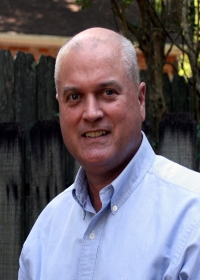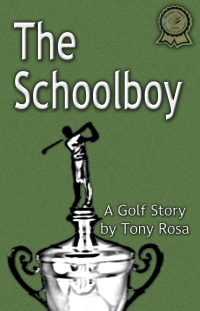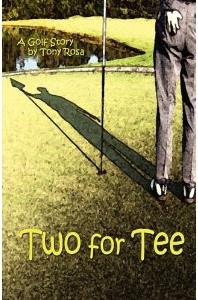 Our guest interview today is with Tony Rosa, author of two books aimed squarely at today’s youth and written to address the kinds of moral challenges that many of us faced when we were young. The Schoolboy and Two for Tee will introduce a young person to good role models which is often as important as buying them a new driver. It’s also less expensive and the lessons last longer.
Our guest interview today is with Tony Rosa, author of two books aimed squarely at today’s youth and written to address the kinds of moral challenges that many of us faced when we were young. The Schoolboy and Two for Tee will introduce a young person to good role models which is often as important as buying them a new driver. It’s also less expensive and the lessons last longer.
1. Who is your target audience?
I hope my stories are good enough to draw wide appeal beyond any specific, targeted group. With the concise and straight-forward writing, the books don’t ramble on for an unnecessary epic length. So far, the main characters have been teenage boys, and so some would say that’s the target audience. But I know golfers of all ages enjoy the books. I’ve even had teenage girls and grandmothers praising the stories. I try not to get too preachy, but I’m hopeful young readers will come away with something. Also, since the characters are all interrelated, I’m trying to convey the old motto of trying to understand others by looking at the world from their perspective.
2. Why junior golf?
Like most writers, I’d have to admit the subject became apparent to me through the creative process. I asked myself: What was the first time you ever felt like you were on your own? I immediately thought about my mother dropping me off at the municipal golf course to play in a junior golf tournament. I signed-up on my own and played with a group of strangers and could remember how alone, yet, how different things were going to be for me after I had proved I could do something on my own. That experience and many that followed provided the inspiration for my first golf story, The Schoolboy.
 3. How are your books different than other golf fiction?
3. How are your books different than other golf fiction?
I’ve read a number of junior golf books, some good, and some that made me wince. For me, most of the golf fiction out there follows a formulaic plot that would have an underdog character winning a tournament at the end of the story. For starters, having never won a golf tournament, I decided to stay away from that. My experience comes from being around the game and hopefully having an ability to identify those peripheral things that teach us lessons. Growing up, I was urged to play in a number of junior golf tournaments and I always came home empty-handed. I attempt to make my golf stories a testament that all of life’s victories are not on display in the trophy case.
4. Are you an advocate for junior golf?
Absolutely. As a kid, I benefited from the generosity of those in the golf community and benefited greatly from participating in tournaments and summers at golf camp. Like my characters in the books, you don’t realize it until you have a chance to look back. But, make no mistake, junior golf is not an easy sport nor is it something for the faint of heart. It is hours out in the hot summer sun carrying a bag over miles of terrain and hacking at piles of practice balls. It does come with a financial cost as well, although with the efforts of some absolutely wonderful junior golf programs, I am convinced that any kid that shows real initiative and drive for the game, that his or her financial situation would not hold them back.
5. What about the life lessons learned in golf. Would you mind explaining what that means?
You can’t watch a tournament on television without catching at least one commercial extolling the life lessons learned in golf; I think that’s true of most sports. In golf, there’s no where to hide from your mistakes. You can’t blame a teammate, you can’t blame the umpire or referee for making a bad call, and you generally can’t claim you were oversized. In golf, you can’t play defense and everyone matches up against the same layout and conditions using the same regulated equipment. There’s generally no home team crowd or cheering squads giving you a lift and the biggest challenges are both physical and mental. I could go on forever just laying the groundwork for what golf is all about, but it certainly provides an arena for you to learn about yourself and your approach to life. Some of these are celebrated in my golf stories.
 6. I recollect two widely reported stories in 2010 involving young golfers and integrity. One guy purposely took a bad shot to help another player advance and the second fellow called a violation on himself.
6. I recollect two widely reported stories in 2010 involving young golfers and integrity. One guy purposely took a bad shot to help another player advance and the second fellow called a violation on himself.
Golf has a long history of teaching young folks. The two examples of integrity you mention are part of the multitude of good acts that happen everyday on the golf course. As a writer, I wanted to look at the other side of the coin. I thought it would be interesting to dig for the root causes and create characters that ponder and often decide to ignore the rules.
In my second novel, “Two for Tee”, Chad and Buzzy learn lessons and sometimes forget what they’ve been taught. They play together in a junior golf tournament where their foursome condones a lack of integrity and they react to the situation at polar opposites. Why would a character cheat in golf the first place? I realized their reasons would be the same as if they decided to cheat off the golf course. When it comes to young folks, ignorance, defiance, and a need to conform were at the top of my list. In “Two for Tee”, I also thought it was important to show how fruitless or how insignificant the result can be when someone decides to bend the rules.
7. Are we missing an opportunity to generate heightened interest with our youth and amateur players if we allow professional golfers to complete in the 2016 Olympics?
First off, I think it’s great for golf. But the way your question is framed, I can’t help but think about how the basketball “Dream Team” exploded onto the Olympic scene. I know it’s all about TV ratings, selling tickets, and endorsement deals, but the coverage of the NBA superstars at the Olympics overshadowed the truly “amateur” athletes at the games. The lesser-knowns worked their whole lives in their sport with the ultimate goal being the representation of their country at the Olympic Games. Meanwhile, the TV cameras were focused on every move made by the well-known members of the “Dream Team”. I’m not knocking the superstar professionals, but it appeared that their participation in the Olympics was little more than a friendly diversion from their regular season goals. As proof, I recall how the best players dropped off the team as the novelty wore off.
As for golf, there is an international competition called the World Cup of Golf. It appears to me that the best U.S. golfers haven’t been interested in competing at this event for a very long time. There are numerous team competitions for both professionals and amateurs with the most popular being the Ryder Cup and the President’s Cup. I recall some recently rumored rumblings about some professionals wanting a cut of the money to appear in these matches.
So, for the young and the amateur wanting to compete for their country in the Olympics, I offer two pieces of advice. Practice and work hard to become one of the best golfers in your country. Or, just wait about twenty years for the spotlight to fade and the professionals to decide the novelty of the Olympics is not part of their regular goals.
Love you 303
that was a great suprise
welldone
Pep, Great interview! I am quite impressed with your literary talents, and I look forward to reading the books! I’m damn proud of you my good friend! Red